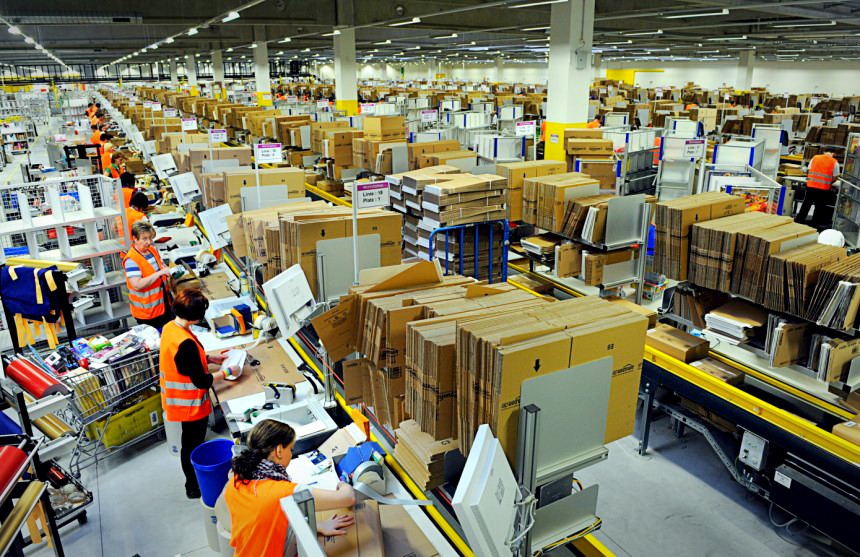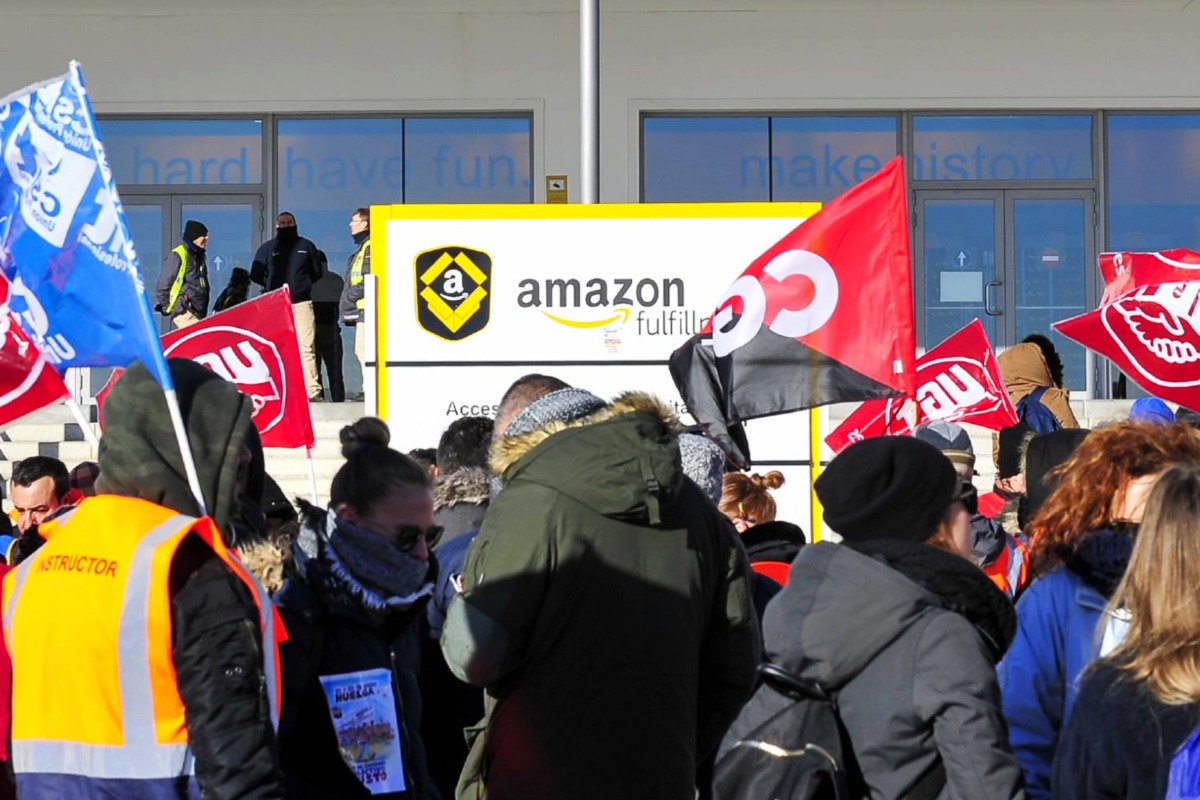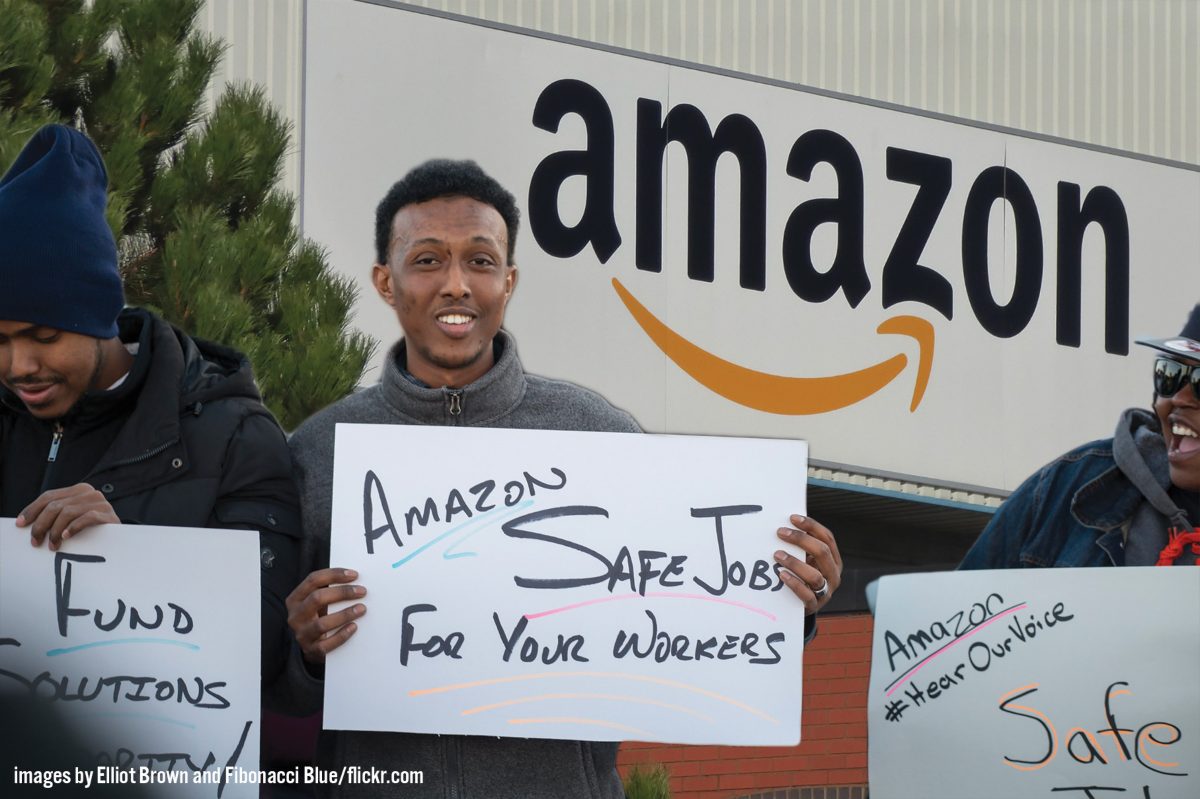The recent ‘Black Friday’ and ‘Cyber Monday’ are the busiest period of the year for Amazon, when CEO Jeff Bezos makes his millions. But all his wealth is created through the brutal exploitation of Amazon workers. And they are fighting back.
Christmas provides an opportunity for giant monopolies to rebrand themselves with their own seasonal adverts in the spirit of giving. Amazon’s performance, however, is much more nervous than that of John Lewis and Coca-Cola.
The Amazon workers are portrayed in the chirpiest of moods, as they attempt to convince you how great it is to work there. The aim is clear: to persuade customers that they should not feel so bad about the exploitative conditions of those who pack their Christmas presents.
By now, however, almost everyone has heard of the working conditions that exist at Amazon. At Christmas, they recruit hundreds of temporary staff for their warehouses in order to meet increased demand. These numbers increase every year, revealing the desperation of those forced into these soul-crushing jobs in order to put food on the table.
This, in turn, brings attention to the key question: at what cost do Amazon bosses reap their billions?
Exploitation
The recent Dispatches documentary on Amazon’s dirty profits revealed the corporation’s dodgy products, online data snooping, and horrendous working conditions. It reminded me of my own working conditions during my days at the Swansea warehouse.
revealed the corporation’s dodgy products, online data snooping, and horrendous working conditions. It reminded me of my own working conditions during my days at the Swansea warehouse.
The job is made mind-numbing by the draconian levels of strictness. The level of interaction with other workers was minimal. There is no flexibility. Slower workers would be penalised with ‘strikes’ – three strikes and you’re out.
I now have a permanent knee injury, caused by repetitive product-lifting – something that could have been avoided if Amazon cared enough to provide employees with proper health and safety training. I’ve had many exploitative and precarious jobs over the years. But none has ever come as close to the literal wage slavery that I experienced at Amazon.
Explosive
 I will never forget the conversation I had with one young, working-class colleague of mine. When we talked about wages and conditions, the conversation gravitated towards the question of organisation. This young worker had never heard about trade unions, nor the concept of going on strike. After we discussed these, he said: “Let me know when something kicks off. I’ll be the first to go on strike.” This reflects the explosive mood in Amazon’s warehouses.
I will never forget the conversation I had with one young, working-class colleague of mine. When we talked about wages and conditions, the conversation gravitated towards the question of organisation. This young worker had never heard about trade unions, nor the concept of going on strike. After we discussed these, he said: “Let me know when something kicks off. I’ll be the first to go on strike.” This reflects the explosive mood in Amazon’s warehouses.
No wonder Amazon’s CEO Jeff Bezos – the richest man on earth – is feeling the need to respond by participating personally in the company’s cushy adverts.
But no amount of expensive ads can stop the process of radicalisation taking place. Amazon workers have already taken strike action in countries such as Spain, USA, Germany and Poland in recent years. And protests have been seen outside Amazon warehouses in a number of countries – in particular over the last week, to coincide with the busiest period of the year: ‘Black Friday’ and ‘Cyber Monday’.
These workers are making themselves heard the only way they can: by organising themselves and taking action. The lesson of the whole history of workers’ struggle is clear – militancy pays.
Dickensian
On the campaign trail, Jeremy Corbyn recently spoke outside an Amazon depot in Sheffield to denounce the Dickensian conditions that are now so prevalent in workplaces across the UK.
Corbyn pledged that Labour would address the scourge of low pay, zero-hour contracts, and precious work that now blights Britain. And he called on Bezos to pay his taxes in order to fund Labour’s programme of progressive reforms.
But billionaire bosses like Bezos will never pay their taxes. Instead of toothless threats of increased taxation, the wealth of these parasites should be expropriated. The big monopolies such as Amazon should be nationalised – without compensation – and run under workers’ control.
This is the kind of bold step that would put a real smile on the face of workers everywhere this Christmas.






